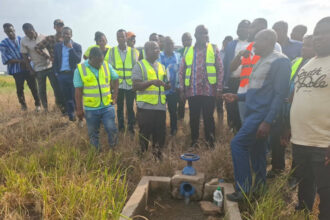Kenya, like the rest of Africa is continually entangled in an intricate web of electoral intrigues and shenanigans of imperial politics. For far too long, the philosophy and practice of power has largely been an expression of colonialism and therefore the emergent political culture based on master-slave(leaders-people) relationship characterized by obtuse greed (pernicious avarice), grabbing and primitive accumulation of wealth, malice, mischief, theft, betrayal, plunder, blackmail, deceit, the list is painfully endless.
The dislocation of power from the state and subsequent reposing of the same in the people no doubt posit a paradigmatic shift in both the philosophy and the practice of power. This reorganization of power no doubt presents a new infrastructure of master-servant relationship in which the people are the master actors and leaders as the servant actors I this new arrangement. Informed and effective citizen participation in democratic processes and in decision making structures no doubt constitute the central plank of the emergent philosophy and practice of power and therefore the culture and practice of politics ordinarily referred to as democracy.
The August polls are fast approaching and Kenya’ landscape is already awash with political activities which in all assessment present a cocktail of both democratic and un-democratic activities. There is no gainsaying the fact that Kenya is a maturing democracy and therefore the onerous task of lacing the nation on a truly democratic trajectory. As a consequence, establishing the state of preparedness towards the forth-coming elections is in itself a task of no mean feat. Whether the country is ready or not for the impending elections, no doubt, a subject of serious debate and rigorous intellectual interactions.
Looked at keenly, the electoral systems are gravitating towards the general elections slated for August 8th 2017.The constitutional commission mandated to oversee and/or superintend over the elections, IEBC, continues to elicit local, regional and international interests with incessant alacrity. With periodic updates and briefs, IEBC is increasingly assuming centrality in both public and private discourse as well enjoying close monitor surveillance from local and international stakeholders and concerned audience. So far it appears IEBC has set itself on an impressive mode of ceaseless efforts towards credible elections.
Despite technical hitches and uncertainty/unpredictability of technology in a highly nuanced electoral terrain, IEBC is increasingly ebullient and therefore is exuding remarkable boldness towards the forth-coming polls. The establishment of Election Technology Advisory Committee confirms IEBC efforts in the right direction in cushioning Kenya Integrated Electoral Management Systems from unnecessary hiccups
So far, the efforts are note-worthy and somewhat commendable especially noting the following;
- Conclusion of mass voter registration in mid February, 2017
- Ongoing verification confirming biometric data of voters of the polling stations up to June 10th 2017
- Accreditation of prisons as registration and polling centre’s for presidential elections
- Preparations towards provisional registers
- Preparation of kits and loading of registration data
- Preparations towards distribution of kits to polling stations
- Preparations towards certification and publication of final registers
- Preparations towards and timelines for nomination of candidates
Delay in undertaking audit of voter register largely as a consequence of a court order no doubt threatens the integrity of electoral process hence the need for IEBC to generate meaningful measures and/or mechanism of leveraging public confidence in the electoral process.
Given the culture of politics in Africa, it suffices to establish the state of preparedness in so far as informed and effective citizen participation in democratic processes is concerned. In particular, Kenya’ political tradition is largely an expression of abrasive, cantankerous and destructive duels and competition. As a consequence, playing dirty and unorthodox political schemes and nasty calculations are the norms rather than the exception. It suffices therefore to establish whether the people are prepared in the right direction in so far as the onerous task of advancing the democratic agenda is at issue.
The political dichotomy of NASA and Jubilee no doubt present polemics of abrasive dimensions. The high stakes involved and the political undertones going round no doubt confirm that a sizeable chunk of the electorates are prepared to do the wrong thing rather than do the right thing. As a consequence, the tribal and ethnic calculations are likely to assume centrality in the August Polls. Political balkanization of the country is already in vogue and political party mentality across the board is tilted towards winning at all costs. Malice, mischief, blackmail, deceit and propaganda are likely to saturate public discourse as well pollute the political environment.
It is rather annoying to note that after a period of ardent democratic struggle, the country is sharply divided along parochial lines than before. The political polarization punctuated with irritating hatred and accompanying obscenities no doubt is in itself a direct indictment on our collective conscience as a nation. Awakening to the reality of a democratic backlash constitutes a priority agenda especially noting the unfolding scenarios and emerging trends. Despite being a maturing democracy, intellectual dishonesty and emboldening myopia are inexcusable especially within the professional circles.
Looked at keenly, the culture of politics, opposition or government, is substantially a relic of colonialism and therefore largely an expression of slave trade in which the colonial yoke of oppression is passed over across generations. The political elite enjoy the special status of slave masters and the people are continually subjugated to mere by-standers or sheer slaves who are only useful during elections and so soon thereafter are abused, misused and trampled upon with reckless abandon.
Despite having fundamentally reorganized power by reason of the current constitution and especially devolution, the political mentality in Kenya is largely rooted in the colonial past. Deconstruction the colonial mindset, no doubt constitutes a critical subject for contemporary Kenya. It is time to shrug off colonial chains and in unison clasp our hands together in all the things that are essential for our collective progress as one nation, one continent, one humanity-one people!
+254-723-745-817














